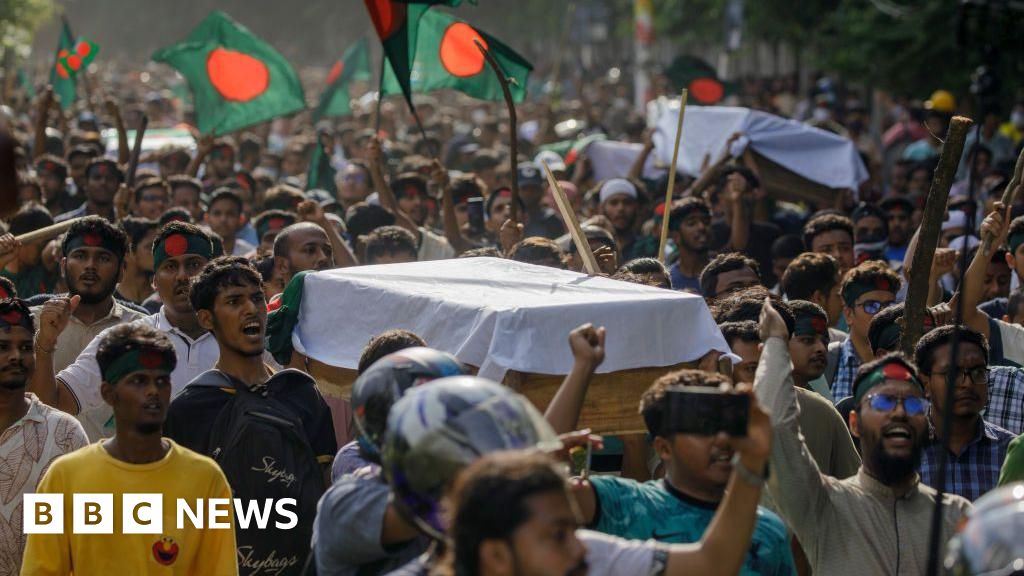Image source, Getty Images
- author, Kelly Ng and Subhajyoti Ghosh, BBC Bangladesh
- role, Singapore and Dhaka
Bangladesh Prime Minister Sheikh Hasina blamed political opponents for the deadly unrest across the country, adding that public safety forced her to impose a night-time curfew.
“I never wanted that,” she said at a meeting with business leaders in the capital, Dhaka, on Monday. “We will lift the curfew whenever the situation improves.”
More than 150 people have been killed in clashes between protesters and police, and the rallies have escalated into calls for Prime Minister Hasina to step down.
Prime Minister Hasina blamed the violence on the main opposition Bangladesh Nationalist Party, Jamaat-e-Islami and its student wing and said the government would work to “crush these extremists and create a better environment.”
Political analysts say the unrest will pose an unprecedented test for one of Asia’s most powerful women.
“Sheikh Hasina and her party’s excessive politicisation of the spirit of the liberation war, year-on-year denial of people’s basic voting rights and the authoritarian nature of her regime have angered large sections of society,” said Mubashar Hasan, a research fellow at the University of Oslo who studies authoritarianism in Asia.
“Unfortunately, she never became the prime minister of all the people. Instead, she remained the leader of just one group,” he told BBC Bangla.
Before Sunday’s ruling, Bangladesh had reserved about 30 percent of its high-paying government jobs for the children of those who fought in the 1971 war of independence from Pakistan.
The court ruled that just 5 percent of roles could be reserved for relatives of veterans.
Hasina is the daughter of Bangladesh’s founding father, Sheikh Mujibur Rahman.
Her government abolished the reservations in 2018 following protests, but a court ordered authorities to reinstate the quotas in June, sparking new unrest.
The protests began about two weeks ago by mostly university students who say the system unfairly favours the children of pro-government groups and want it to be replaced with meritocratic hiring.
Prime Minister Hasina initially ignored the protesters’ concerns, but analysts say this only exacerbated the unrest.
On July 14, she continued to justify the quota system by reinforcing the division between the descendants of pro-emancipation and anti-emancipation supporters.
“why [the protesters] “Why do we have so much resentment towards freedom fighters? If the grandson of a freedom fighter is not getting quota benefits, then why should the grandson of a razakar get them?” she told a press conference.
Razakars (a derogatory term in Bangladesh) are a paramilitary group made up of ethnic Bangladeshis who fought on Pakistan’s side in the 1971 war. The group has also been accused of violent crimes.
Hasina’s remarks galvanised even more protesters within hours. That evening, thousands of students took to the streets of Dhaka to protest against her remarks.
Many more people took part in rallies across the country in the days that followed. Numerous arson attacks occurred around the country, including at state broadcaster BTV.
Around 500 people have also been arrested in the past two weeks and authorities have called in the military and imposed a nationwide curfew.
The country’s mobile internet and text messaging services have been suspended for at least five days in an effort to quell the protests.
Some student leaders have vowed to continue protesting, demanding justice for protesters killed and detained in recent days, the resignation of government ministers and an apology from Prime Minister Hasina.


